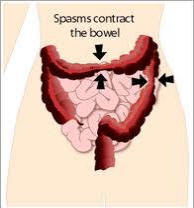What is irritable bowel syndrome
Irritable bowel syndrome* (IBS) is a “syndrome,”
meaning a group of symptoms. The most common
symptoms of IBS are abdominal pain or discomfort
often reported as cramping, bloating, gas, diarrhea,
and/or constipation. IBS affects the colon, or large
bowel, which is the part of the digestive tract that
stores stool.
IBS is not a disease. It’s a
functional disorder, meaning that the bowel doesn’t
work, or function, correctly.

The patients get abdominal pain suddenly after
eating, the pain may be accompanied by abdominal
swelling, this swelling can cause severe pain. In
our own studies at Nanotech we have found the
swelling is only present in external abdominal
muscles and completely relived by external abdominal
trigger point injection. Not temporary this
injection results in a long term improvement.
The bouts of alternate diarrhea and constipation
will respond to medication described in our e-book
"the flame within". Knowledge is power.
What causes IBS?
CDPUSA in collaboration with
Nanotech has studied a group of patients
and we think IBS is caused by stress triggered
inflammatory disorder. The nerves and muscles in the
bowel appear to be extra sensitive in people with
IBS. Muscles may contract too much when you eat.
These contractions can cause cramping and diarrhea
during or shortly after a meal. Or the nerves may
react when the bowel stretches, causing cramping or
pain. We have seen IBS in patients with
Fibromyalgia.
What are the symptoms
of IBS?
The main symptoms of IBS are
abdominal pain or
discomfort in the abdomen, often relieved by or
associated with a bowel movement
chronic
diarrhea, constipation, or a combination of both
Other symptoms are
whitish mucus in the stool
a swollen or bloated abdomen
the feeling that
you have not finished a bowel movement
Women
with IBS often have more symptoms during their
menstrual periods.
All patients with IBS mst try a gluten free diet and
see theCeliac
chapter.
How is IBS treated?
Treatment may involvediet changes ,medicine ,stress
relief
You may have to try a few things to
see what works best for you. Your doctor can help
you find the right treatment plan.
Diet Changes
Some foods and drinks make IBS
worse.
Foods and drinks that may cause or worsen
symptoms includefatty foods, like french friesmilk
products, like cheese or ice cream
chocolate
alcohol caffeinated drinks, like coffee and some
sodas carbonated drinks, like soda
These
foods may make IBS worse.
To find out which foods
are a problem, keep a diary that trackswhat you eat
during the day
what symptoms you have when
symptoms occur
what foods always make you feel
sick
Some foods make IBS better.
Fiber may
reduce the constipation associated with IBS because
it makes stool soft and easier to pass. However,
some people with IBS who have more sensitive nerves
may feel a bit more abdominal discomfort after
adding more fiber to their diet. Fiber is found in
foods such as breads, cereals, beans, fruits, and
vegetables.
Examples of foods with fiber include
Fruits Vegetables Breads, cereals, and beans
apples peaches broccoli (raw) cabbage
carrots
(raw) peas kidney beans lima beans
whole-grain
bread whole-grain cereal
Add foods with fiber to
your diet a little at a time to let your body get
used to them. Too much fiber at once can cause gas,
which can trigger symptoms in a person with IBS.
Your doctor may ask you to add more fiber to your
diet by taking a fiber pill or drinking water mixed
with a special high-fiber powder.
Eat small meals.
Large meals can cause cramping and diarrhea
in people with IBS. If this happens to you, try eating four or five
small meals a day instead of less-frequent big meals.
Medicine
Prayer is the best medicine , followed by homepathic
Ignatia to reduce stress. Olive oil to control
constipation and go on a dairy free and glutenfree
diet.